
Eupithecia is the largest genus of moths of the family Geometridae, and the namesake and type genus of tribe Eupitheciini. Species in the genus are, like those of other genera in the tribe, commonly known as pugs. The genus is highly speciose, with over 1400 species, and members of the genus are present in most of the world with exception of Australasia. Roughly a quarter of described Eupithecia species occur in the Neotropical realm, where they have an especially high species diversity in the montane rain forests of the Andes. The genus includes a few agricultural pest species, such as the currant pug moth, Eupithecia assimilata, which is a pest on hops, and the cloaked pug moth, Eupithecia abietaria, which is a cone pest in spruce seed orchards.

The wormwood pug is a moth of the family Geometridae. The species was first described by Carl Alexander Clerck in 1759. It is a common species across the Palearctic region as well as North America.

The currant pug is a moth of the family Geometridae. The species was first described by Henry Doubleday in 1856. It is found across the Nearctic and Palearctic regions. Its occurrence extends eastwards to the Near East, Urals, the Ussuri region and on to the island of Sakhalin. In the Pyrenees and the Alps it rises to altitudes of 1500 and 1800 metres respectively.

The tawny speckled pug is a moth of the family Geometridae.
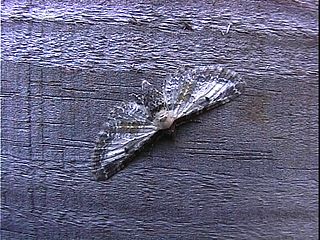
The bordered pug is a moth of the family Geometridae. It is found across the Palearctic region. In the Pyrenees, the species can be found up to an altitude of 1800 metres. It prefers steppe areas, open bushy terrain, fallow and unimproved grasslands and parkland.

Eupithecia innotata, the angle-barred pug, is a moth of the family Geometridae. The species was first described by Johann Siegfried Hufnagel in 1767. It ranges from Spain in the west to western Siberia and Central Asia in the east.

Eupithecia tantillaria, the dwarf pug, is a moth of the family Geometridae. It was described by Jean Baptiste Boisduval in 1840. The species can be found in the Palearctic realm.

Eupithecia inturbata, the maple pug, is a moth of the family Geometridae. The species can be found in central Europe, Great Britain and southern Scandinavia.
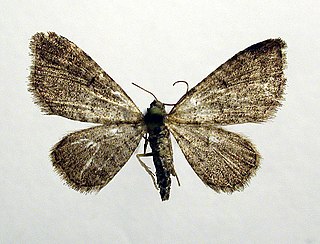
Eupithecia plumbeolata, the lead-coloured pug, is a moth of the family Geometridae. The species can be found all over Europe ranging to the Urals, then through Central Asia to Siberia and to Sayan mountains, the Altai and the Amur. In the Alps, the species occurs up 2000 metres above sea level and in the Pyrenees up to in 2400 metres.

Eupithecia linariata, the toadflax pug, is a moth of the family Geometridae. The species can be found in Europe and from Anatolia to Tajikistan and Iran.
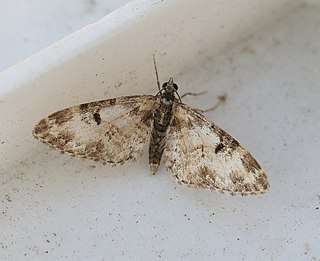
Eupithecia irriguata, the marbled pug, is a moth of the family Geometridae. The species can be found in Europe and North Africa.

Eupithecia dodoneata, the oak-tree pug, is a moth of the family Geometridae. The species can be found in Europe. Local occurrences are found in Asia Minor, the Caucasus as well as in Morocco. In the Pyrenees and the Alps, it rises to altitudes of 1000 metres. The species prefers dry oak and oak mixed forests.

Eupithecia millefoliata, the yarrow pug, is a moth of the family Geometridae. The species was first described by Adolph Rössler in 1866 and it can be found in Europe and Russia.
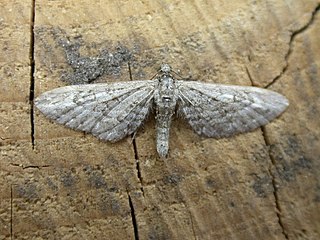
Eupithecia nanata, the narrow-winged pug, is a moth of the family Geometridae. The species was first described by Jacob Hübner in 1813. It can be found all over Europe including Russia and Ukraine. In the Alps it occurs up to 2,200 metres (7,200 ft) above sea level and in the Pyrenees to 2400 meters. The species prefers dry or boggy heathlands.

Eupithecia tripunctaria, the white-spotted pug, is a moth of the family Geometridae. The species can be found from Europe to Korea and Japan and in North America.
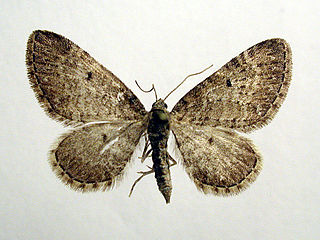
Eupithecia satyrata, the satyr pug, is a species of moth of the family Geometridae. It was described by Jacob Hübner in 1813. It is found from Ireland, through northern and central Europe east to all of Russia and central Asia and western Siberia to Tibet. It is also present in North Africa and North America.
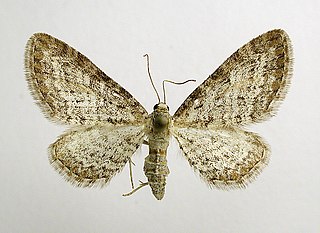
Eupithecia subumbrata, the shaded pug, is a moth of the family Geometridae. The species was first described by Michael Denis and Ignaz Schiffermüller in 1775. It is found from Mongolia and the Altai Mountains through Siberia, central Asia, Asia Minor and Russia to western Europe and from central Scandinavia to the Mediterranean region.

Eupithecia trisignaria, the triple-spotted pug, is a moth of the family Geometridae. It is found from across the Palearctic realm from Europe to Siberia.


















